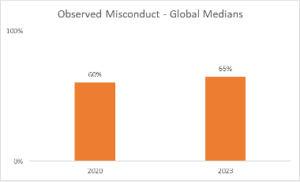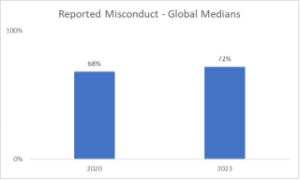The Global Business Ethics Survey (GBES) conducted by the Ethics & Compliance Initiative (ECI) provides valuable insights into workplace ethics and compliance from the perspective of employees. I recently had the opportunity to visit with ECI President Pat Harned on the 2023 GBES. This survey has become a reliable benchmark for organizations to compare their workplace culture with third-party research, allowing them to identify areas for improvement and address potential risks. In this Part 2 of a five-part blog post series on the 2023 GBES we look at Key Findings 2 and 3.
Key Finding: 2 – Workplace misconduct is at an all-time high.
Workplace misconduct is a prevalent issue that organizations worldwide must address. According to the 2023 GBES, a staggering 65% of employees have witnessed violations of company standards or the law within the past year. This alarming statistic highlights the urgent need for effective strategies to tackle workplace misconduct.

One crucial aspect of addressing workplace misconduct is the role of managers. Managers play a pivotal role in the reporting and resolution process, as their supportive response can greatly impact the success of resolving misconduct. Research has shown that employees are more likely to report misconduct if they have a good working relationship with their supervisor. Therefore, organizations must prioritize training managers to recognize and respond supportively to reports.
Creating a culture of trust and accountability is essential in addressing workplace misconduct. Trust is a fundamental element that permeates an organization, impacting employees’ willingness to report misconduct. When employees trust their managers and feel valued as individuals, they are more likely to come forward with reports. On the other hand, a lack of trust can lead to underreporting and a perpetuation of misconduct.
Educating employees about the importance of reporting misconduct is crucial. Organizations need to provide clear channels for reporting and ensure employees know where to go when they witness wrongdoing. By messaging to employees that reporting to management is essential and productive, organizations can encourage employees to come forward and help solve problems internally. This approach is more effective than resorting to social media or external agencies, which may not contribute to long-term workplace improvement.
Key Finding: 3 – Globally, reporting of observed misconduct is at a record high.
The global landscape of misconduct reporting varies significantly. Countries like India, Egypt, Nigeria, Bolivia, and Kenya have high reporting rates, indicating a willingness among employees to report misconduct. However, high reporting rates can also lead to high retaliation rates, as observed in some of these countries. In contrast, countries like Chile, Canada, South Korea, Japan, and Hungary have lower reporting levels, possibly due to cultural factors and employees’ perceptions of authority.

To address workplace misconduct effectively, organizations must improve the reporting process, train managers to respond supportively, and foster a culture that values trust and accountability. It is crucial to strike a balance between encouraging reporting and ensuring the safety of employees who come forward. Organizations should also consider the impact of their decisions on public trust in business, as misconduct erodes organizational cultures and can damage reputations.
In conclusion, addressing workplace misconduct through reporting and managerial support is a complex task that requires careful consideration of various factors. Organizations must prioritize training managers, fostering trust, and educating employees about the importance of reporting. By creating a culture that values accountability and supports those who come forward, organizations can effectively address workplace misconduct and promote a healthier and more ethical work environment.
Join us in Part 3 where we consider the disturbing findings of retaliation.
For more information, check out the ECI podcast series with Pat Harned discussing the GBES, here.
[View source.]